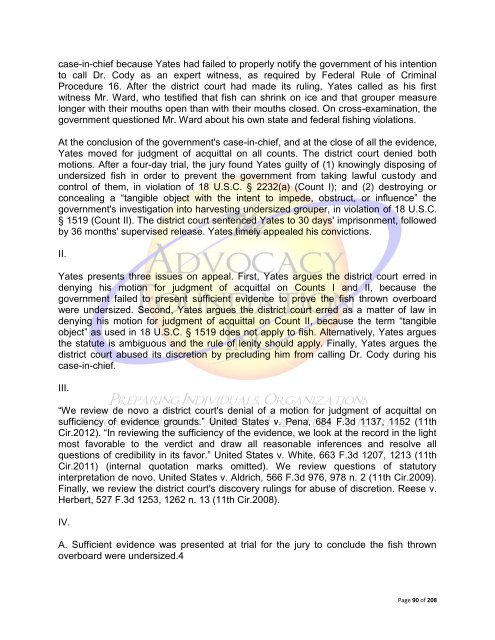The Sarbanes-Oxley Act of 2002
The Sarbanes-Oxley Act of 2002
The Sarbanes-Oxley Act of 2002
You also want an ePaper? Increase the reach of your titles
YUMPU automatically turns print PDFs into web optimized ePapers that Google loves.
case-in-chief because Yates had failed to properly notify the government <strong>of</strong> his intention<br />
to call Dr. Cody as an expert witness, as required by Federal Rule <strong>of</strong> Criminal<br />
Procedure 16. After the district court had made its ruling, Yates called as his first<br />
witness Mr. Ward, who testified that fish can shrink on ice and that grouper measure<br />
longer with their mouths open than with their mouths closed. On cross-examination, the<br />
government questioned Mr. Ward about his own state and federal fishing violations.<br />
At the conclusion <strong>of</strong> the government's case-in-chief, and at the close <strong>of</strong> all the evidence,<br />
Yates moved for judgment <strong>of</strong> acquittal on all counts. <strong>The</strong> district court denied both<br />
motions. After a four-day trial, the jury found Yates guilty <strong>of</strong> (1) knowingly disposing <strong>of</strong><br />
undersized fish in order to prevent the government from taking lawful custody and<br />
control <strong>of</strong> them, in violation <strong>of</strong> 18 U.S.C. § 2232(a) (Count I); and (2) destroying or<br />
concealing a “tangible object with the intent to impede, obstruct, or influence” the<br />
government's investigation into harvesting undersized grouper, in violation <strong>of</strong> 18 U.S.C.<br />
§ 1519 (Count II). <strong>The</strong> district court sentenced Yates to 30 days' imprisonment, followed<br />
by 36 months' supervised release. Yates timely appealed his convictions.<br />
II.<br />
Yates presents three issues on appeal. First, Yates argues the district court erred in<br />
denying his motion for judgment <strong>of</strong> acquittal on Counts I and II, because the<br />
government failed to present sufficient evidence to prove the fish thrown overboard<br />
were undersized. Second, Yates argues the district court erred as a matter <strong>of</strong> law in<br />
denying his motion for judgment <strong>of</strong> acquittal on Count II, because the term “tangible<br />
object” as used in 18 U.S.C. § 1519 does not apply to fish. Alternatively, Yates argues<br />
the statute is ambiguous and the rule <strong>of</strong> lenity should apply. Finally, Yates argues the<br />
district court abused its discretion by precluding him from calling Dr. Cody during his<br />
case-in-chief.<br />
III.<br />
“We review de novo a district court's denial <strong>of</strong> a motion for judgment <strong>of</strong> acquittal on<br />
sufficiency <strong>of</strong> evidence grounds.” United States v. Pena, 684 F.3d 1137, 1152 (11th<br />
Cir.2012). “In reviewing the sufficiency <strong>of</strong> the evidence, we look at the record in the light<br />
most favorable to the verdict and draw all reasonable inferences and resolve all<br />
questions <strong>of</strong> credibility in its favor.” United States v. White, 663 F.3d 1207, 1213 (11th<br />
Cir.2011) (internal quotation marks omitted). We review questions <strong>of</strong> statutory<br />
interpretation de novo. United States v. Aldrich, 566 F.3d 976, 978 n. 2 (11th Cir.2009).<br />
Finally, we review the district court's discovery rulings for abuse <strong>of</strong> discretion. Reese v.<br />
Herbert, 527 F.3d 1253, 1262 n. 13 (11th Cir.2008).<br />
IV.<br />
A. Sufficient evidence was presented at trial for the jury to conclude the fish thrown<br />
overboard were undersized.4<br />
Page 90 <strong>of</strong> 208

















